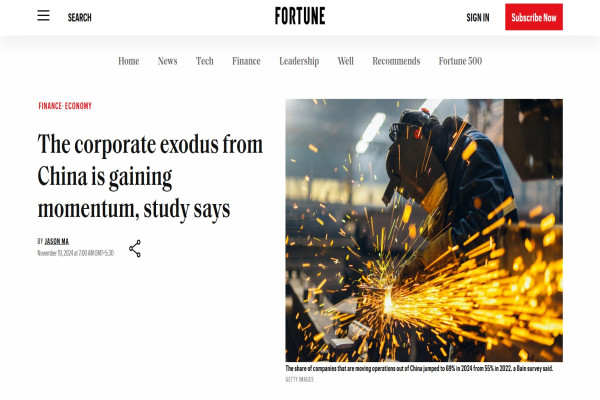
Fortune Magazine has published a study by global management consulting firm Bain and Company, that 69% of companies are planning to move out of China, a jump from 55% in 2022. This predates Donald Trump’s plan to impose hefty tariffs on Chinese products.
The study, titled by Fortune Magazine as The corporate exodus from China is gaining Momentum, is based on a survey of 166 chief executive officers and chief operating officers. Thirty nine per cent of them said their destination was the Indian subcontinent, while 16% indicated the US or Canada and 11% southeast Asia. Ten per cent were bound for Europe and 8% to South America.
A staggering 81% of the executives said they were planning to bring supply chains closer to their markets (it was 63% in 2022) and they were also looking at mixing offshore production and manufacturing closer to home.
The companies were moving given geopolitical uncertainties and rising costs. For the chiefs of some US firms, the main motivation was the Inflation Reduction Act, which seeks to position the country as the world leader in domestic clean energy manufacturing by offering tax credits and other incentives.
This is bad news for China where foreign investment has been in a slump for the last three years. The Fortune report says it is down by $13 billion in the first nine months of this year despite the government’s best efforts to revive FDI.
It spells serious trouble for China which has already seen a real estate crash, debt issues and even pockets of deflation. Trump’s threat of tariffs as high as 60% on China made products including electric vehicles, comes on the back of cheap exports that have flooded world markets.
Local manufacturing in these countries is not able to compete and experts say China subsidises its exports, even undercutting wherever possible to ensure its hold on the market.
Although recent stimulus measures show that China is trying to boost domestic consumption, it may have come too late. The world, as the Bain report suggests, is turning away from China and the mandarins in Beijing need to get their own people to start spending more.
Thirty eight years in journalism, widely travelled, history buff with a preference for Old Monk Rum. Current interest/focus spans China, Technology and Trade. Recent reads: Steven Colls Directorate S and Alexander Frater's Chasing the Monsoon. Netflix/Prime video junkie. Loves animal videos on Facebook. Reluctant tweeter.




